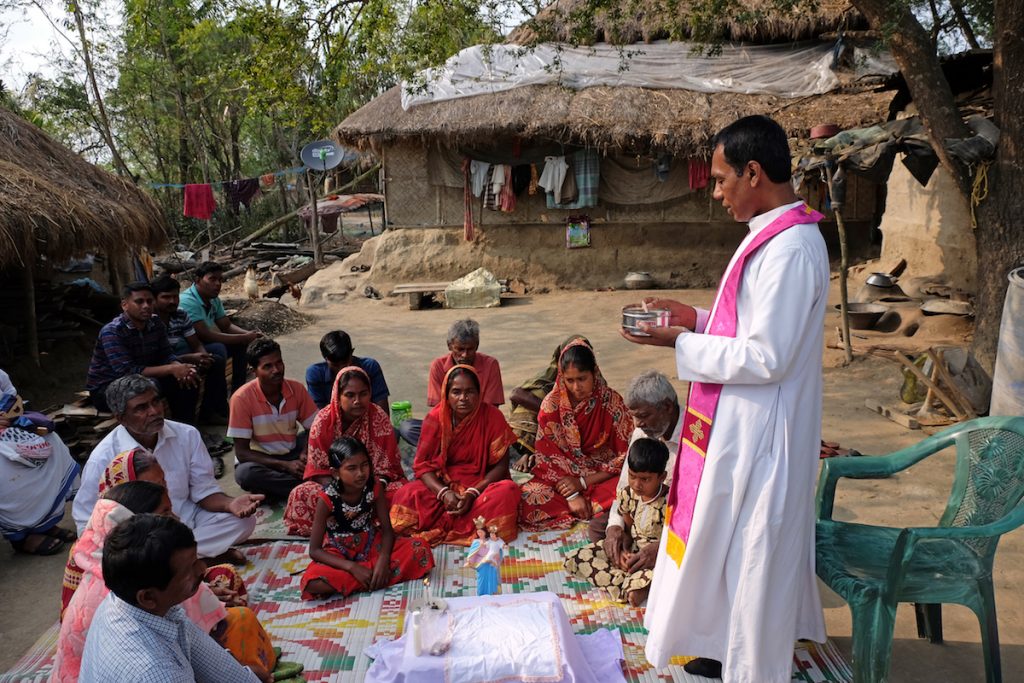Groups of Dalit Catholics or those considered lower caste in India are seeking more representation in the Church’s power structure or they will approach the Vatican to be allowed to start their own rite.
The term Dalit refers to the “untouchables” under India’s ancient caste system. They are considered unclean because they do menial work like manual scavenging and are traditionally ostracized.
The Indian Constitution had officially abolished caste distinctions in 1949 but the enduring legacy of caste discrimination continues to this day.
Dalits make up over 65 percent of India’s Catholics, yet none of them are among the four cardinals and 31 archbishops in India, said Father AJX Bosco, advisor for the National Council of Dalit Christians (NCDC).
Of the over 180 Catholic bishops, only 11 are Dalits. There are 30,300 priests in India, but Dalits priests are only 4 per cent or 1,200 priests, said Father Bosco, a Dalit, who was the first Jesuit provincial of Southern Andhra Pradesh state.
There are no Dalit bishops in the two eastern oriental rites churches — Syro Malabar and Syro Malankara.
Franklin Caesar Thomas, co-founder and coordinator of the NCDC said that Dalits are generally neglected when selecting priests for the episcopacy. “We are urging the Vatican to end this discrimination,” Thomas said.
“If the Church does not immediately remove the discriminatory process, we would take permission from the Holy See to start our own Indian Dalit Catholic rite,” Thomas said.
“This Dalit Church could be predominantly run by the Dalit community bishops under the leadership of the Holy Father. The Dalit Catholic Church or the Dalit Catholic Eastern Oriental Rite would accommodate all people irrespective of caste,” he said.

Ingrained
Twenty-eight years after the caste distinctions were officially abolished in India, the first Dalit — John Molagada — was appointed Bishop of Elluru in the southern state of Andhra Pradesh in 1977, said Father Bosco.
Media expert Father Francis Arackal said that the problem is that caste consciousness is so ingrained in people that it’s deeper than the religious feeling that all are one in Christ.
“I know a diocese where the bishop discriminates against priests of lower caste,” Father Francis Arackal. “The Jesuits of Madurai province, the largest in India, had publicly denounced caste discrimination yet it does take place there too,” the Dominican priest said.
“Discrimination like in society does happen in Church also, only that in some places it is more pronounced than in others,” he said.
Bishop Sarat Chandra Nayak of Berhampur (eastern state of Odisha) chairman of the Office of Scheduled Caste and Backward Class of Catholic Bishops’ Conference of India (CBCI), admits there is discrimination against Dalits in the Catholic Church.
To say that there is no discrimination is not true, he said.
Discrimination is there in some independent dioceses especially in Tamil Nadu, south India, where there are dual churches and dual cemeteries. Dalits are segregated from the general population.
Bishop Nayak said the statistics show the number of Dalit bishops is low. There could be a caste bias in the selection process or there is a lack of qualified candidates, in which case also the Church is responsible for not nurturing them to take up leadership roles, the prelate said.
Father Bosco said the general excuse is that there are no candidates who fit the bill for the episcopate or that the Holy Spirit did not desire it.
But E D Charles, general secretary NCDC, said it is wrong to say there are no suitable candidates.
“There are many Dalit priests who have the necessary credentials for the post of a bishop — above 50 years of age, eminent spiritually and in ecclesiastical studies like Licentiate degrees in sacred scripture, theology, or Canon law, have leadership and administrative qualities,” Charles said.
Thomas said the apostolic nuncio should seize of the matter and ask for siuitable Dalit names.
“The Vatican or its representative in India are manipulated by the upper caste bishops in the country,” he said.
The CBCI as a national body has accepted there is discrimination in the Church. The issue is raised in most of its annual meetings. In 2016 the CBCI came out with the policy on the Dalit Empowerment, said Bishop Nayak.
But Thomas said he has little faith in this process. “The Church is only doing lip service as many of CBCI meetings have accepted the blame and resolved to solve the issue bringing out guidelines and policies; but these are never implemented,” he said.
Bishop Nayak said the CBCI is not a controlling body. “If the concerned bishop of a place or region does not follow the guidelines, there is little we can do,” the prelate said.
Father Bosco said the NCDC has asked for a Dalit desk in the Vatican. “We had made the request to Cardinal Peter Turkson, prefect of the Vatican’s Dicastery for Promoting Integral Human Development, when he came for the South Asian Christian Dalit Conference in Bangalore in February 2019,” he said.
He said there are at present three vacancies for the post of Bishop in Tamil Nadu. Two more will crop up soon. “Let us see if Dalits are considered,” Father Bosco said.
Charles, general secretary NCDC said they are meeting bishops of the southern state. “If that does not fructify, we will start agitations — peaceful protests in Tamil Nadu from the third week of September after which we will shift to Delhi to hold protests in front of CBCI office and also at the Vatican Embassy,” he said.
Six Dalit groups, headed by the NCDC, held a virtual conference recently and resolved to appeal to the Indian Church, the apostolic nuncio and the pope to stop “visible and invisible discrimination” against them.
If negotiations don’t succeed then demonstrations would be held in front of CBCI offices and at other places, besides national and international conferences would be conducted to highlight the issue, the meeting resolved.